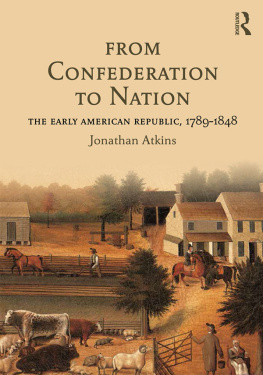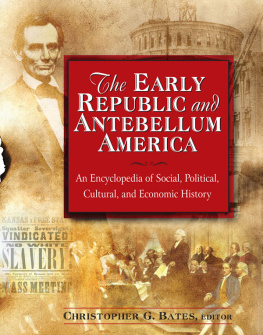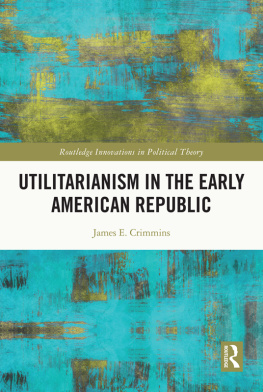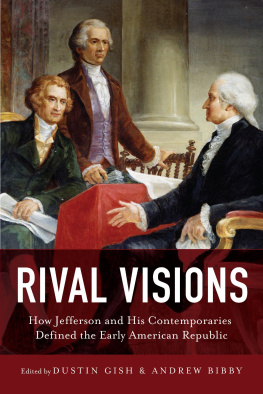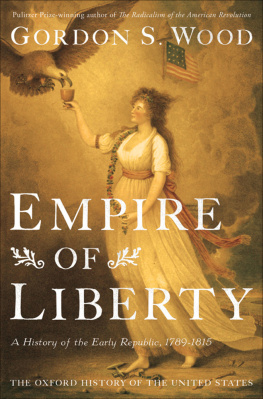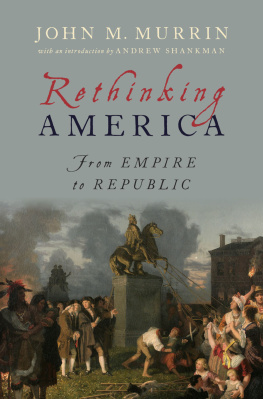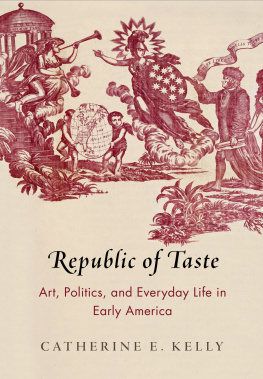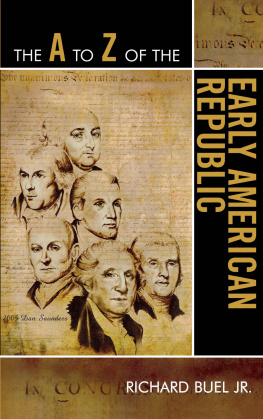About the Contributors
David Brion Davis, Sterling Professor Emeritus, Yale University, and Director of Yales Gilder Lehrman Center for the Study of Slavery, Resistance, and Abolition. He is author of The Problem of Slavery in Western Culture (1966; rep. 1988), winner of the 1967 Pulitzer Prize for Nonfiction; The Problem of Slavery in the Age of Revolution 17701823 (1975; 2d ed. 1999), winner of the National Book Award, the Albert J. Beveridge Award, and the Bancroft Prize; and Slavery and Human Progress (1986). His most recent publication is In the Image of God: Religion, Moral Values, and our Heritage of Slavery (2001).
Lacy K. Ford Jr. is professor of history at the University of South Carolina and is author of Origins of Southern Radicalism: The South Carolina Up-country, 18001860 (1991). His current research interests focus on antebellum political culture, and he is currently at work on Making Southern Conservatism: Political Thought in the Jacksonian South (forthcoming).
Jon Gjerde is professor of history at the University of California, Berkeley. He is author of From Peasants to Farmers: The Migration from Balestrand, Norway to the Upper Middle West (1985) and The Minds of the West: Ethno-cultural Evolution in the Rural Middle West, 18301917 (1997). He is editor of Major Problems in American Immigration and Ethnic History (1998) and Major Problems in American History (2002). He is currently at work on a study of anti-Catholicism in the antebellum United States.
Lois E. Horton is professor of sociology at George Mason University. She has taught at Howard University, has been a visiting scholar at the National Museum of American History of the Smithsonian Institution, and has been a visiting professor at the University of Hawaii and at Fredrick Maximilian University in Munich, Germany. Her books include the coauthored Black Bostonians: Family Life and Community Struggle in the Antebellum North (1979; rep. 1999); In Hope of Liberty: Culture, Community and Protest Among Northern Free Blacks 17001865 (1997); and Hard Road to Freedom: The Story of African America (2001).
Joanne Pope Melish is associate professor of history at the University of Kentucky, where her research and teaching focus on the production and deployment of racial ideologies in the nineteenth-century United States. She is the author of Disowning Slavery: Gradual Emancipation and Race in New England, 17801860 (1998).
Michael A. Morrison is associate professor of history at Purdue University and coeditor of the Journal of the Early Republic. He is author of Slavery and the American West: The Eclipse of Manifest Destiny and the Coming of the Civil War (1997), The Human Tradition in Antebellum America (2000), and coeditor with Ralph D. Gray of New Perspectives on the Early Republic: Essays from the Journal of the Early Republic, 19811991 (1994). In 1998 the Carnegie Foundation for the Advancement of Teaching named him Indiana Professor of the Year.
Daniel K. Richter is the Richard S. Dunn Director of the McNeil Center for Early American Studies and professor of history at the University of Pennsylvania. His research and teaching focus on colonial North America and on Native American history prior to 1800. Before joining the Penn faculty, he taught at Dickinson College and the University of East Anglia, and he has been a visiting professor at Columbia University. Richter is author of Facing East from Indian Country: A Native History of Early America (2001) and The Ordeal of the Longhouse: The Peoples of the Iroquois League in the Era of European Colonization (1992), and coeditor, with James H. Merrell, of Beyond the Covenant Chain: The Iroquois and Their Neighbors in Indian North America, 16001800 (1987).
David R. Roediger teaches in history and in the Afro-American Studies and Research Program at University of IllinoisUrbana, where he holds the Babcock Chair. He has previously taught at Northwestern University, University of Missouri, and University of Minnesota. His books include Our Own Time (1989, with Philip S. Foner); The Wages of Whiteness (1991); Towards the Abolition of Whiteness (1994); and Colored White (2002). His current writing is on southern and eastern European immigrants and race in early twentieth-century United States.
James P. Ronda holds the H. G. Barnard Chair in Western American History at the University of Tulsa and is a past president of the Western History Association. A specialist in the history of the exploration of the American West, his books include Lewis and Clark among the Indians (1984); Astoria and Empire (1990); Revealing America: Image and Imagination in the Exploration of North America (1996); Voyages of Discovery: Essays on the Lewis and Clark Expedition (1998); Jeffersons West: A Journey with Lewis and Clark (2001); and Finding the West: Explorations with Lewis and Clark (2001). Professor Ronda has been a consultant and had on-camera roles in a number of television documentaries including those for PBS, C-SPAN, A&E, and the BBC. He is currently writing one of the catalogue essays for the National Lewis and Clark Bicentennial Exhibition.
James Brewer Stewart is the James Wallace Professor of history at Macalester College. His many published works include Joshua R. Giddings and the Tactics of Radical Politics (1970); Holy Warriors: The Abolitionists and American Slavery (1976); and Wendell Phillips: Libertys Hero. His most recent publication is To Heal the Scourge of Prejudice: The Life and Writings of Hosea Easton, which he edited with George R. Price.
The Pursuit of Whiteness: Property, Terror, and Expansion, 17901860
David R. Roediger
P aul Gilroy, holding acerbically forth in the collection Black British Cultural Studies, warns that attempts to write in an interdisciplinary way about identity can send the aspirant practitioners of cultural studies scuttling back toward the quieter sanctuaries of their old disciplinary affiliations, where the problems and potential pleasures of thinking through identity are less formidable and engaging. Behavior after the scuttling, he adds, follows disciplinary lines: Anthropologists utter sighs of relief, psychologists rub their hands together in glee, philosophers relax [and] literary critics look blank and perplexed. Historians remain silent.1
In the particular case of the study of white identity and privilege in the United States, historians have been less silent than Gilroys model implies. The major review essays on what has lamentably been named whiteness studies consistently place social history at the center of a burgeoning multidisciplinary literature, citing the work of Alexander Saxton, Theodore Allen, and Noel Ignatiev, among others.2 Most ambitious accounts of white identity by (in terms of formal departmental affiliations) non-historians, including those of Karen Brodkin, Susan Gubar, Eric Lott, and Michael Rogin, frame their material historically. Moreover, I will argue, a too often lost historical literature on American Indians and white identity anticipated many of the insights of more recent work and deserves rereading in the light of cultural studies.3
Nonetheless, tensions surround the place of history in investigations of white identity. Much cultural studies work in the area lacks historical grounding and ignores or misconceives the emphasis on class relations common among historians of whiteness. Conversely, not a few historians disdain cultural studies approaches, and even inquiries into race and cultural representation more generally, as ethereal and frivolous. One goal of this essay is therefore to expose an audience of historians to critical insights from those not formally or entirely in the history business. Implicit throughout, that agenda is forwarded explicitly at the outset in a prelude bringing together the writings of the legal analyst and critical race theorist Cheryl Harris and the American Studies scholar Saidiya Hartman around the themes of property, happiness, and terror in the formation of white identity.4 The main section of the essay will then use a dramatic moment in the Lincoln-Douglas debates as a window through which the strengths, weaknesses, and gaps of recent writings on whiteness, expansion, and terror in the early national and antebellum periods might be surveyed. In arguing that relatively neglected older studies offer promising approaches to deepen understanding of that moment in the Lincoln-Douglas confrontation, the necessity of considering white racial formation in the context of a settler colonial nation, as well as a slaveholding one, will receive emphasis.


